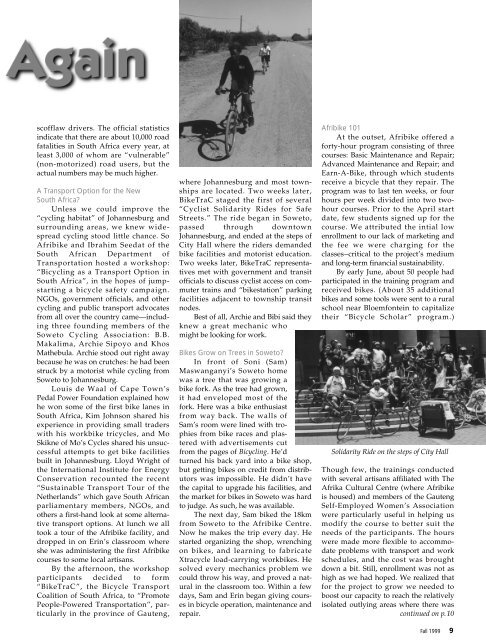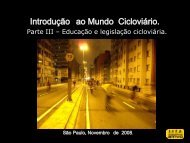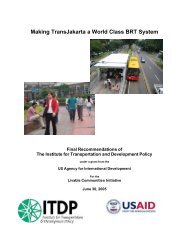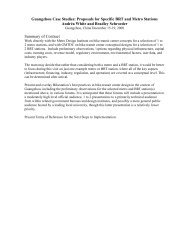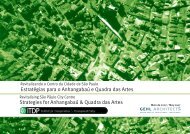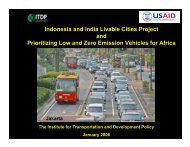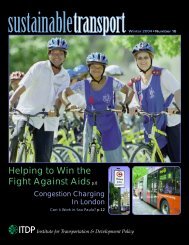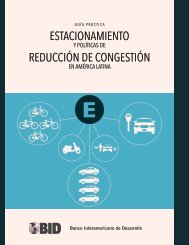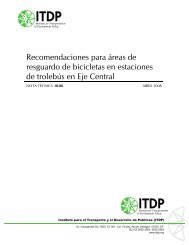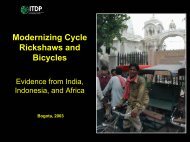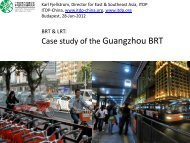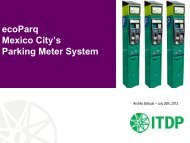Download PDF - ITDP | Institute for Transportation and Development ...
Download PDF - ITDP | Institute for Transportation and Development ...
Download PDF - ITDP | Institute for Transportation and Development ...
Create successful ePaper yourself
Turn your PDF publications into a flip-book with our unique Google optimized e-Paper software.
scofflaw drivers. The official statistics<br />
indicate that there are about 10,000 road<br />
fatalities in South Africa every year, at<br />
least 3,000 of whom are “vulnerable”<br />
(non-motorized) road users, but the<br />
actual numbers may be much higher.<br />
A Transport Option <strong>for</strong> the New<br />
South Africa?<br />
Unless we could improve the<br />
“cycling habitat” of Johannesburg <strong>and</strong><br />
surrounding areas, we knew widespread<br />
cycling stood little chance. So<br />
Afribike <strong>and</strong> Ibrahim Seedat of the<br />
South African Department of<br />
<strong>Transportation</strong> hosted a workshop:<br />
“Bicycling as a Transport Option in<br />
South Africa”, in the hopes of jumpstarting<br />
a bicycle safety campaign.<br />
NGOs, government officials, <strong>and</strong> other<br />
cycling <strong>and</strong> public transport advocates<br />
from all over the country came—including<br />
three founding members of the<br />
Soweto Cycling Association: B.B.<br />
Makalima, Archie Sipoyo <strong>and</strong> Khos<br />
Mathebula. Archie stood out right away<br />
because he was on crutches: he had been<br />
struck by a motorist while cycling from<br />
Soweto to Johannesburg.<br />
Louis de Waal of Cape Town’s<br />
Pedal Power Foundation explained how<br />
he won some of the first bike lanes in<br />
South Africa, Kim Johnson shared his<br />
experience in providing small traders<br />
with his workbike tricycles, <strong>and</strong> Mo<br />
Skikne of Mo’s Cycles shared his unsuccessful<br />
attempts to get bike facilities<br />
built in Johannesburg. Lloyd Wright of<br />
the International <strong>Institute</strong> <strong>for</strong> Energy<br />
Conservation recounted the recent<br />
“Sustainable Transport Tour of the<br />
Netherl<strong>and</strong>s” which gave South African<br />
parliamentary members, NGOs, <strong>and</strong><br />
others a first-h<strong>and</strong> look at some alternative<br />
transport options. At lunch we all<br />
took a tour of the Afribike facility, <strong>and</strong><br />
dropped in on Erin’s classroom where<br />
she was administering the first Afribike<br />
courses to some local artisans.<br />
By the afternoon, the workshop<br />
participants decided to <strong>for</strong>m<br />
“BikeTraC”, the Bicycle Transport<br />
Coalition of South Africa, to “Promote<br />
People-Powered <strong>Transportation</strong>”, particularly<br />
in the province of Gauteng,<br />
where Johannesburg <strong>and</strong> most townships<br />
are located. Two weeks later,<br />
BikeTraC staged the first of several<br />
“Cyclist Solidarity Rides <strong>for</strong> Safe<br />
Streets.” The ride began in Soweto,<br />
passed through downtown<br />
Johannesburg, <strong>and</strong> ended at the steps of<br />
City Hall where the riders dem<strong>and</strong>ed<br />
bike facilities <strong>and</strong> motorist education.<br />
Two weeks later, BikeTraC representatives<br />
met with government <strong>and</strong> transit<br />
officials to discuss cyclist access on commuter<br />
trains <strong>and</strong> “bikestation” parking<br />
facilities adjacent to township transit<br />
nodes.<br />
Best of all, Archie <strong>and</strong> Bibi said they<br />
knew a great mechanic who<br />
might be looking <strong>for</strong> work.<br />
Bikes Grow on Trees in Soweto?<br />
In front of Soni (Sam)<br />
Maswanganyi’s Soweto home<br />
was a tree that was growing a<br />
bike <strong>for</strong>k. As the tree had grown,<br />
it had enveloped most of the<br />
<strong>for</strong>k. Here was a bike enthusiast<br />
from way back. The walls of<br />
Sam’s room were lined with trophies<br />
from bike races <strong>and</strong> plastered<br />
with advertisements cut<br />
from the pages of Bicycling. He’d<br />
turned his back yard into a bike shop,<br />
but getting bikes on credit from distributors<br />
was impossible. He didn’t have<br />
the capital to upgrade his facilities, <strong>and</strong><br />
the market <strong>for</strong> bikes in Soweto was hard<br />
to judge. As such, he was available.<br />
The next day, Sam biked the 18km<br />
from Soweto to the Afribike Centre.<br />
Now he makes the trip every day. He<br />
started organizing the shop, wrenching<br />
on bikes, <strong>and</strong> learning to fabricate<br />
Xtracycle load-carrying workbikes. He<br />
solved every mechanics problem we<br />
could throw his way, <strong>and</strong> proved a natural<br />
in the classroom too. Within a few<br />
days, Sam <strong>and</strong> Erin began giving courses<br />
in bicycle operation, maintenance <strong>and</strong><br />
repair.<br />
Afribike 101<br />
At the outset, Afribike offered a<br />
<strong>for</strong>ty-hour program consisting of three<br />
courses: Basic Maintenance <strong>and</strong> Repair;<br />
Advanced Maintenance <strong>and</strong> Repair; <strong>and</strong><br />
Earn-A-Bike, through which students<br />
receive a bicycle that they repair. The<br />
program was to last ten weeks, or four<br />
hours per week divided into two twohour<br />
courses. Prior to the April start<br />
date, few students signed up <strong>for</strong> the<br />
course. We attributed the intial low<br />
enrollment to our lack of marketing <strong>and</strong><br />
the fee we were charging <strong>for</strong> the<br />
classes–critical to the project’s medium<br />
<strong>and</strong> long-term financial sustainability.<br />
By early June, about 50 people had<br />
participated in the training program <strong>and</strong><br />
received bikes. (About 35 additional<br />
bikes <strong>and</strong> some tools were sent to a rural<br />
school near Bloemfontein to capitalize<br />
their “Bicycle Scholar” program.)<br />
Solidarity Ride on the steps of City Hall<br />
Though few, the trainings conducted<br />
with several artisans affiliated with The<br />
Afrika Cultural Centre (where Afribike<br />
is housed) <strong>and</strong> members of the Gauteng<br />
Self-Employed Women’s Association<br />
were particularly useful in helping us<br />
modify the course to better suit the<br />
needs of the participants. The hours<br />
were made more flexible to accommodate<br />
problems with transport <strong>and</strong> work<br />
schedules, <strong>and</strong> the cost was brought<br />
down a bit. Still, enrollment was not as<br />
high as we had hoped. We realized that<br />
<strong>for</strong> the project to grow we needed to<br />
boost our capacity to reach the relatively<br />
isolated outlying areas where there was<br />
continued on p.10<br />
Fall 1999 9


